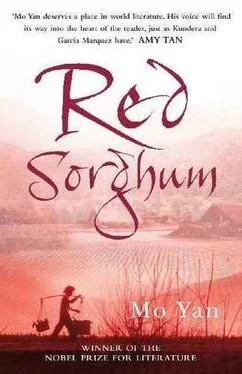Mo Yan - Red Sorghum
Здесь есть возможность читать онлайн «Mo Yan - Red Sorghum» весь текст электронной книги совершенно бесплатно (целиком полную версию без сокращений). В некоторых случаях можно слушать аудио, скачать через торрент в формате fb2 и присутствует краткое содержание. Год выпуска: 2003, Издательство: Arrow, Жанр: Современная проза, на английском языке. Описание произведения, (предисловие) а так же отзывы посетителей доступны на портале библиотеки ЛибКат.
- Название:Red Sorghum
- Автор:
- Издательство:Arrow
- Жанр:
- Год:2003
- ISBN:нет данных
- Рейтинг книги:3 / 5. Голосов: 1
-
Избранное:Добавить в избранное
- Отзывы:
-
Ваша оценка:
- 60
- 1
- 2
- 3
- 4
- 5
Red Sorghum: краткое содержание, описание и аннотация
Предлагаем к чтению аннотацию, описание, краткое содержание или предисловие (зависит от того, что написал сам автор книги «Red Sorghum»). Если вы не нашли необходимую информацию о книге — напишите в комментариях, мы постараемся отыскать её.
, a novel of family and myth, is told through a series of flashbacks that depict events of staggering horror set against a landscape of gemlike beauty, as the Chinese battle both Japanese invaders and each other in the turbulent war years of the 1930s.
A legend in China, where it won major literary awards inspired the Oscar-nominated film,
is a book in which fable and history collide to produce fiction that is entirely new and unforgettable.
Red Sorghum — читать онлайн бесплатно полную книгу (весь текст) целиком
Ниже представлен текст книги, разбитый по страницам. Система сохранения места последней прочитанной страницы, позволяет с удобством читать онлайн бесплатно книгу «Red Sorghum», без необходимости каждый раз заново искать на чём Вы остановились. Поставьте закладку, и сможете в любой момент перейти на страницу, на которой закончили чтение.
Интервал:
Закладка:
Mo Yan
Red Sorghum
With this book I respectfully invoke the heroic, aggrieved souls wandering in the boundless bright-red sorghum fields of my hometown. As your unfilial son, I am prepared to carve out my heart, marinate it in soy sauce, have it minced and placed in three bowls, and lay it out as an offering in a field of sorghum. Partake of it in good health!
One: Red Sorghum
1
THE NINTH DAY of the eighth lunar month, 1939. My father, a bandit’s offspring who had passed his fifteenth birthday, was joining the forces of Commander Yu Zhan’ao, a man destined to become a legendary hero, to ambush a Japanese convoy on the Jiao-Ping highway. Grandma, a padded jacket over her shoulders, saw them to the edge of the village. ‘Stop here,’ Commander Yu ordered her. She stopped.
‘Douguan, mind your foster-dad,’ she told my father. The sight of her large frame and the warm fragrance of her lined jacket chilled him. He shivered. His stomach growled.
Commander Yu patted him on the head and said, ‘Let’s go, foster-son.’
Heaven and earth were in turmoil, the view was blurred. By then the soldiers’ muffled footsteps had moved far down the road. Father could still hear them, but a curtain of blue mist obscured the men themselves. Gripping tightly to Commander Yu’s coat, he nearly flew down the path on churning legs. Grandma receded like a distant shore as the approaching sea of mist grew more tempestuous; holding on to Commander Yu was like clinging to the railing of a boat.
That was how Father rushed towards the uncarved granite marker that would rise above his grave in the bright-red sorghum fields of his hometown. A bare-assed little boy once led a white billy goat up to the weed-covered grave, and as it grazed in unhurried contentment, the boy pissed furiously on the grave and sang out: ‘The sorghum is red — the Japanese are coming — compatriots, get ready — fire your rifles and cannons —’
Someone said that the little goatherd was me, but I don’t know. I had learned to love Northeast Gaomi Township with all my heart, and to hate it with unbridled fury. I didn’t realise until I’d grown up that Northeast Gaomi Township is easily the most beautiful and most repulsive, most unusual and most common, most sacred and most corrupt, most heroic and most bastardly, hardest-drinking and hardest-loving place in the world. The people of my father’s generation who lived there ate sorghum out of preference, planting as much of it as they could. In late autumn, during the eighth lunar month, vast stretches of red sorghum shimmered like a sea of blood. Tall and dense, it reeked of glory; cold and graceful, it promised enchantment; passionate and loving, it was tumultuous.
The autumn winds are cold and bleak, the sun’s rays intense. White clouds, full and round, float in the tile-blue sky, casting full round purple shadows onto the sorghum fields below. Over decades that seem but a moment in time, lines of scarlet figures shuttled among the sorghum stalks to weave a vast human tapestry. They killed, they looted, and they defended their country in a valiant, stirring ballet that makes us unfilial descendants who now occupy the land pale by comparison. Surrounded by progress, I feel a nagging sense of our species’ regression.
After leaving the village, the troops marched down a narrow dirt path, the tramping of their feet merging with the rustling of weeds. The heavy mist was strangely animated, kaleidoscopic. Tiny droplets of water pooled into large drops on Father’s face, clumps of hair stuck to his forehead. He was used to the delicate peppermint aroma and the slightly sweet yet pungent odour of ripe sorghum wafting over from the sides of the path — nothing new there. But as they marched through the heavy mist, his nose detected a new, sickly-sweet odour, neither yellow nor red, blending with the smells of peppermint and sorghum to call up memories hidden deep in his soul.
Six days later, the fifteenth day of the eighth month, the night of the Mid-Autumn Festival. A bright round moon climbed slowly in the sky above the solemn, silent sorghum fields, bathing the tassels in its light until they shimmered like mercury. Among the chiselled flecks of moonlight Father caught a whiff of the same sickly odour, far stronger than anything you might smell today. Commander Yu was leading him by the hand through the sorghum, where three hundred fellow villagers, heads pillowed on their arms, were strewn across the ground, their fresh blood turning the black earth into a sticky muck that made walking slow and difficult. The smell took their breath away. A pack of corpse-eating dogs sat in the field staring at Father and Commander Yu with glinting eyes. Commander Yu drew his pistol and fired — a pair of eyes was extinguished. Another shot, another pair of eyes gone. The howling dogs scattered, then sat on their haunches once they were out of range, setting up a deafening chorus of angry barks as they gazed greedily, longingly at the corpses. The odour grew stronger.
‘Jap dogs!’ Commander Yu screamed. ‘Jap sons of bitches!’ He emptied his pistol, scattering the dogs without a trace. ‘Let’s go, son,’ he said. The two of them, one old and one young, threaded their way through the sorghum field, guided by the moon’s rays. The odour saturating the field drenched Father’s soul and would be his constant companion during the cruel months and years ahead.
Sorghum stems and leaves sizzled fiercely in the mist. The Black Water River, which flowed slowly through the swampy lowland, sang in the spreading mist, now loud, now soft, now far, now near. As they caught up with the troops, Father heard the tramping of feet and some coarse breathing fore and aft. The butt of a rifle noisily bumped someone else’s. A foot crushed what sounded like a human bone. The man in front of Father coughed loudly. It was a familiar cough, calling to mind large ears that turned red with excitement. Large transparent ears covered with tiny blood vessels were the trademark of Wang Wenyi, a small man whose enlarged head was tucked down between his shoulders.
Father strained and squinted until his gaze bored through the mist: there was Wang Wenyi’s head, jerking with each cough. Father thought back to when Wang was whipped on the parade ground, and how pitiful he had looked. He had just joined up with Commander Yu. Adjutant Ren ordered the recruits: Right face! Wang Wenyi stomped down joyfully, but where he intended to ‘face’ was anyone’s guess. Adjutant Ren smacked him across the backside with his whip, forcing a yelp from between his parted lips. Ouch, mother of my children! The expression on his face could have been a cry, or could have been a laugh. Some kids sprawled atop the wall hooted gleefully.
Now Commander Yu kicked Wang Wenyi in the backside.
‘Who said you could cough?’
‘Commander Yu…’ Wang Wenyi stifled a cough. ‘My throat itches….’
‘So what? If you give away our position, it’s your head!’
‘Yes, sir,’ Wang replied, as another coughing spell erupted.
Father sensed Commander Yu lurching forward to grab Wang Wenyi around the neck with both hands. Wang wheezed and gasped, but the coughing stopped.
Father also sensed Commander Yu’s hands release Wang’s neck; he even sensed the purple welts, like ripe grapes, left behind. Aggrieved gratitude filled Wang’s deep-blue, frightened eyes.
The troops turned quickly into the sorghum, and Father knew instinctively that they were heading southeast. The dirt path was the only direct link between the Black Water River and the village. During the day it had a pale cast; the original black earth, the colour of ebony, had been covered by the passage of countless animals: cloven hoofprints of oxen and goats, semicircular hoofprints of mules, horses, and donkeys; dried road apples left by horses, mules, and donkeys; wormy cow chips; and scattered goat pellets like little black beans. Father had taken this path so often that later on, as he suffered in the Japanese cinder pit, its image often flashed before his eyes. He never knew how many sexual comedies my grandma had performed on this dirt path, but I knew. And he never knew that her naked body, pure as glossy white jade, had lain on the black soil beneath the shadows of sorghum stalks, but I knew.
Читать дальшеИнтервал:
Закладка:
Похожие книги на «Red Sorghum»
Представляем Вашему вниманию похожие книги на «Red Sorghum» списком для выбора. Мы отобрали схожую по названию и смыслу литературу в надежде предоставить читателям больше вариантов отыскать новые, интересные, ещё непрочитанные произведения.
Обсуждение, отзывы о книге «Red Sorghum» и просто собственные мнения читателей. Оставьте ваши комментарии, напишите, что Вы думаете о произведении, его смысле или главных героях. Укажите что конкретно понравилось, а что нет, и почему Вы так считаете.












